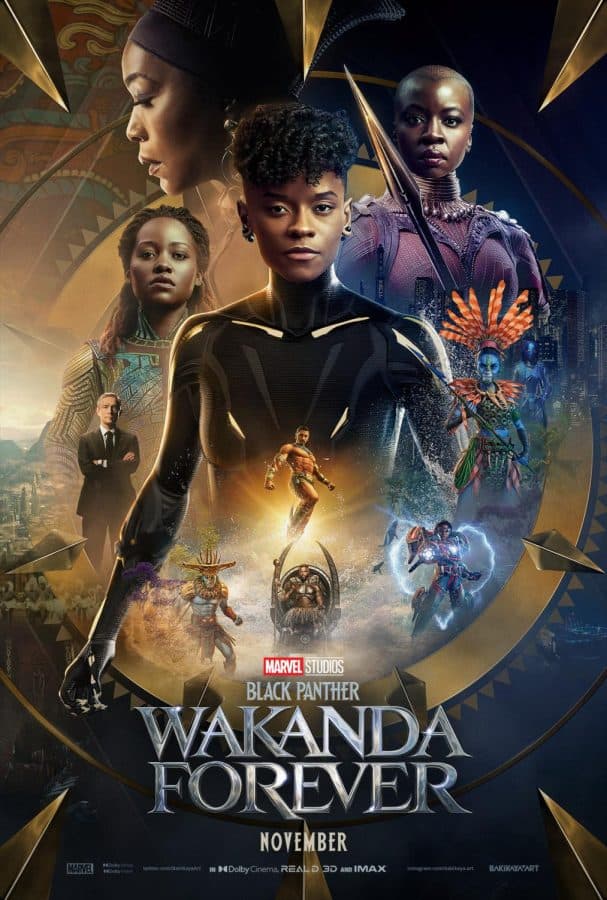Culture Pick: “Black Panther: Wakanda Forever” and the gaping hole left by Chadwick Boseman
November 30, 2022
“Black Panther: Wakanda Forever” is the sequel to the critically acclaimed “Black Panther,” which boasts a 96% on Rotten Tomatoes and is one of the most widely beloved films in the Marvel Cinematic Universe. The sequel is an intriguing addition to the MCU and features a pleasant focus on its female characters, but as a whole, it suffers from the gaping hole left by the death of star Chadwick Boseman, who died from colon cancer in 2020, and the resulting lack of main-character material. The film is an unfortunate continuation of Marvel’s streak of good-not-great projects stemming from the universe’s loss of its core characters.
“Wakanda Forever” begins with the death of King T’Challa, formerly played by the late Boseman, at the hands of a disease which his sister, the precocious and hyper-intelligent Shuri, believes could have been healed by the ancient Wakandan “heart-shaped herb” that was destroyed by villain Killmonger in the previous film. Shuri repeatedly but unsuccessfully tries to recreate the herb.
A year later, Wakanda is being pressured by the rest of the world to share its precious material, vibranium. Among organizations attempting to forcibly take the metal is the CIA, which, after building a vibranium detector and discovering an undersea pocket of it, sends a retrieval mission. This mission is thwarted by the film’s main villain, Namor, the leader of the water-breathing Talokan people, who are skilled in combat. The Talokan are unknown to the surface population so the CIA assumes the attack on its mission was carried out by Wakanda.
Namor pins the blame for the attack on Wakanda, whose stinginess with its vibranium has spurred a global race for the resource. He pays a visit to Queen Ramonda and Shuri and poses an ultimatum: they are to track down the scientist who created the vibranium tracker — young genius and college student Riri Williams — and hand her over to the Talokan, or face war with the Talokan people.
Shuri and Ramonda successfully track down Riri, but are reluctant to hand her over to certain death; their hesitance results in an intense battle that ends with Shuri and Riri being taken to the kingdom of Talokan in order to reach an agreement. Fearing for her daughter’s life, Queen Ramonda sends a rescue mission. It is successful, but it destroys the thin diplomatic connection between Wakanda and Talokan, and the two find themselves in an intense, bloody showdown that could very well result in the collapse of either civilization.
“Wakanda Forever” has the plot and mechanics to be a great movie. Its focus on intercultural dynamics provides a point of definite interest, especially relating to cultures which are not usually the subject of mainstream Marvel movies. On a technical level it is superb, beholding all the visual and mechanical mastery which comes from the MCU’s luxurious budget.
That being said, the loss of Chadwick Boseman, who undeniably anchored the original “Black Panther,” is felt in this sequel. While the story itself is quite compelling, it is carried forward by side characters ungracefully thrust into main character roles.
“Franchises are built on star power, and without Boseman, one of Marvel’s brightest and most promising, Black Panther: Wakanda Forever is haunted by his absence, draped in the kind of sorrow that can’t be ignored,” said Jason Parham for Wired.
The movie as a whole struggles with character issues: Shuri is a likable but lackluster lead; Ramonda, who was used sparsely in “Black Panther,” feels a bit out of place in her larger part; M’baku, one of the most loveable faces in the series, is once again relegated to comedic relief; Namor, who follows the standard villain arc of “doing the right thing in the wrong way,” is generic; and Riri, who is seemingly supposed to function as an accessible and empowering personality for younger audiences, is bland and underdeveloped.
This is the chief reason why “Wakanda Forever” straddles the line between mediocrity and greatness: it feels a bit too inconsequential. It is not that the character focus is misplaced, but rather that those characters simply are not up to task. As Kyle Smith writes in his review for the movie in the Wall Street Journal, “[Wakanda Forever] takes its time with character and plot but doesn’t develop either to any satisfying degree.”
Unfortunate as it is to say, “Black Panther: Wakanda Forever” is something of a disappointment. It has its positive elements, and it does not quite find itself among the worst of the MCU’s offerings, but it is a far cry from its predecessor and falls into place with the rest of Marvel’s recent uninspiring releases.
“Wakanda Forever” currently has an 84% critics’ score on Rotten Tomatoes with a 94% audience score and sits at a 7.3/10 on IMDB. It was released on Nov. 11 and can be seen exclusively in theaters. It is expected to release on Disney+ streaming in early 2023.











